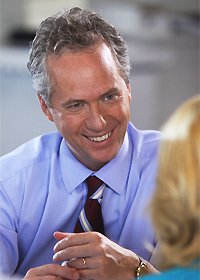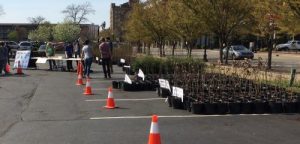 Mayor Greg Fischer announced today that Louisville is joining cities across the globe by setting a goal of an 80 percent reduction in greenhouse gas emissions by 2050.
Mayor Greg Fischer announced today that Louisville is joining cities across the globe by setting a goal of an 80 percent reduction in greenhouse gas emissions by 2050.
In May 2016, Mayor Fischer signed the Global Covenant of Mayors, an agreement signed by leaders of more than 9,000 cities across the world committing to inventory and develop a strategy to reduce greenhouse gas emissions. Globally, cities play a major role in these efforts, as 70 percent of greenhouse gas emissions come from cities.
Greenhouse gases get trapped in the atmosphere, which causes warming and leads to climate change. These gases are emitted when we drive, turn on the lights in our homes and buildings, and when waste breaks down in the landfill, among other sources.
The city’s Global Covenant commitment is a three-step process: conducting the inventory, setting a reduction target and creating a strategy to meet that target.
Louisville inventoried its greenhouse gas emissions in 2017, releasing a draft report indicating emissions had been reduced by 16.9 percent between 2010 and 2016. Further review, including additional information regarding Louisville’s energy use, clarified that the actual community-wide decrease in emissions was 10.1 percent.
“Clearly, there is work to be done,” Mayor Fischer said. “But this is about protecting the future of our planet. Many of our city’s largest businesses already have adopted corporate practices and goals that will help us move the needle, and we urge individuals to do their part as well. It will take all of us to achieve this very ambitious goal.”
Cities across the country, such as Cincinnati, Atlanta, Cleveland, Denver and Philadelphia, are also setting a reduction goal of 80 percent, which aligns with the scientific consensus of what is required to avoid the most damaging effects of climate change.
For Louisville, the next step is to develop a strategy on how we as a community will achieve the goal in a way that supports our goals for creating a more resilient, equitable and environmentally just city.
The city has created a survey to gauge public interest and support for potential options, such as planting more trees, conserving energy or using automobiles less.
Copies of the survey will be shared at upcoming community meetings, and an online survey is available at the city’s website, www.louisvilleky.gov, and at Louisville Free Public Library branches.
The next phase of the city’s Global Covenant of Mayors commitment is to begin climate adaptation planning, which will be conducted in alignment with the city’s Louisville Resilience program.
Staff from the Louisville Metro Office of Sustainability will meet with community groups in coming months to gather feedback and further elaborate on next steps. The first of those meetings will be with the Rubbertown Community Advisory Council on Jan. 10 and the 100 Resilient Cities Work Group on Jan. 28. If you would like for staff to attend your neighborhood association, board or city council meeting, please call 574-6285 or email sustainability@louisvilleky.gov
For more information on Louisville’s effort to reduce greenhouse gas emissions, please visit https://louisvilleky.gov/government/sustainability/greenhouse-gas-inventory
Mayor Greg Fischer announced today that the Office of Sustainability has implemented its first Energy Project Assessment District (EPAD) project with partner Citizens Union Bank (CUB).
EPAD is a tool that encourages property owners install energy efficiency mprovements, renewable energy and water conservation measures at commercial and multi-family properties, by allowing them to acquire private funding that can be paid off through a voluntary assessment administered by the Jefferson County Sheriff in the same manner as a property tax bill. The program allows property owners to extend the term of the loan to 30 years and finance up to 100 percent of an energy project’s cost.
The city’s first EPAD project was made possible through a loan from CUB and allowed property owner Tony Holland to construct a 15-unit apartment at 110 Weisser Avenue with high-efficiency heating and cooling controls, an exterior insulation system and cool roofing materials.
“I applaud the Office of Sustainability, CUB and Tony Holland for forming a partnership to make our city more sustainable. This project is a showcase of how property owners and developers can make a great financial choice that will have great environmental benefits for our community,” Mayor Fischer said. “Our city needs more lending institutions and property owners to partner with us on projects like this one.”
“We are thrilled to close on the first project of our EPAD program. EPAD will help promote energy efficiency and will ultimately contribute to reducing greenhouse gas emissions and improving the quality of life in Louisville,” said Louisville Metro Office of Sustainability Director Maria Koetter. “We applaud Tony Holland and CUB for paving the way.”
“At CUB we care a great deal about conservation efforts that benefit the communities we serve”, said David Bowling, CUB’s CEO. “We are proud to be able to partner with the City and property owners like Tony Holland on the EPAD Program. They were great to work with and hopefully this will be just the beginning of many similar projects in the future.”
The EPAD program offers unique benefits to the property owner, including low interest, and fixed rates that are affixed to the property title and not the property owner. That separation means the property owner is not tying up other credit lines for essential operating expenses.
Energy efficient improvements and renewable energy projects—like solar panels, green roofs and LED lighting—aid in Louisville Metro’s efforts alleviate urban heat and decrease the amount of pollutants impacting local air quality.
EPAD financing is available to office, retail, industrial, non-profits and multi-family residential units consisting of five or more dwelling units. Commercial properties include for-profit businesses and non-governmental, non-residential, tax-exempt properties such as privately operated community centers and hospitals.
An eligible energy-efficient, water-efficient or renewable energy improvement project must have a minimum cost of $20,000, a useful life of at least five years and be permanently affixed to the property title. Additionally, the property owner must demonstrate that the project reduces energy or water usage or generate renewable power for the property and that the improvements will remain with property upon sale or transfer of title.
The Kentucky General Assembly enacted legislation in 2015 authorizing local governments to establish EPADs and an ordinance approved by Metro Council in 2016 designated the entirety of Louisville Metro as an EPAD.

Photo: Division of Community Forestry
To celebrate Arbor Day and Earth Day, the Louisville Metro Office of Sustainability, will give away 1,000 trees on Saturday, April 21 from 12-2 p.m. at the Hope Community Garden in south Louisville (1400 Bicknell Drive).
“In our growing city, we are always looking for ways to improve our community’s health and our environment,” Erin Thompson, Louisville Metro’s Urban Forester, said. “One of the best ways to do this is by planting a tree. We encourage all residents to join us in celebrating Earth Day and Arbor Day by planting a tree.”
At this giveaway event, any Jefferson County resident may take up to three trees on a first come, first served basis. A driver’s license or utility bill must be provided for proof of residence. All trees should be planted on private property.
All trees that will be given away are native to Kentucky and will be provided to residents in three gallon containers. Species available on Saturday include Allegheny Serviceberry, Redbud, Black Oak, Eastern Red Cedar, Pawpaw, American Hornbeam, Sugar Maple, River Birch, Tulip Poplar and Red Oak.
For more information, please visit https://louisvilleky.gov/government/division-community-forestry
 Weather
Weather Traffic
Traffic @LouisvilleDispatch
@LouisvilleDispatch @LouisvilleDisp
@LouisvilleDisp Subscribe
Subscribe